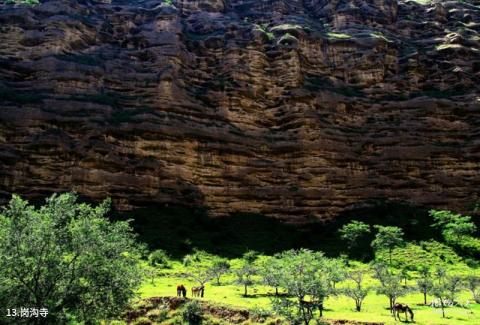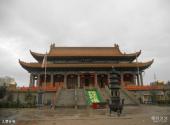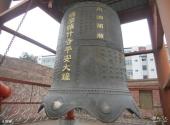
Scenic spot introduction:
Wuwei Luoshi Temple Pagoda It is a Buddhist pagoda built to commemorate the contribution of the Western Regions monk Kumarajiva in promoting Buddhism and translating Buddhist scriptures in Wuwei. It symbolizes the long and civilized history of the ancient city of Wuwei and is a witness to the cultural exchange between China and the West on the Silk Road more than 1,500 years ago.Attractions distribution:
Among the Buddhist monks who came to China from the Silk Road in ancient times, Kumarajiva was the one who had the closest and most prestigious relationship with Liangzhou. Kumarajiva was born in Kuche, Xinjiang in 350 AD. He was born in a family of prime ministers for generations and was famous for his mastery of Buddhism since childhood. Later, he went to Kashmir and other places to learn and lecture from many famous teachers, studied Buddhist scriptures, and had profound attainments. His teachings spread to the Western Regions and his name spread to the Eastern Countries. In 382 AD, Fu Jian, the King of the Former Qin Dynasty, ordered General Lu Guang and others to lead troops to march into the Western Regions. In 385 AD, Lu Guang defeated Qiuci and conquered more than 30 countries in the Western Regions. He obtained Kumarajiva and more than 20,000 camels and returned with a full load. When passing through Liangzhou, he heard that Fu Jian was defeated in the "Battle of Feishui" and was killed by his general Yao Chang, so he stopped going east and established the Later Liang Kingdom in Liangzhou, with its capital in Guzang (now Liangzhou). From then on, Kumarajiva lived in Liangzhou, preaching, studying Chinese, and spreading Buddhism for 17 or 18 years. In 401 AD, Yao Xing, the son of Yao Chang, the king of the Later Qin Dynasty, welcomed Kumarajiva to Chang'an and honored him as the state teacher. At the request of Yao Xing, the king of the Later Qin Dynasty, he began his translation career. He had 3,000 disciples in China, and hundreds of people in Chang'an learned to translate scriptures from him. In 409 AD, Kumarajiva passed away in Chang'an at the age of 60. He was evaluated by later generations as one of the three great monks of the Sixteen Kingdoms period (Fotucheng, Shi Daoan, and Kumarajiva) and one of the four great translators in China (Xuanzang, Kumarajiva, Zhendi, and Bukong).Scenic spot qualifications:
National 2A-level scenic spotScenic spot features:
Cultural tours, historical tours, the Silk Road, pagodas, templesAttraction Address
Travel Guide
Best time to visit:
All seasons
Tourist Transportation
Scenic spot location:
China > Gansu Province > Wuwei City > Liangzhou District
How to get there:
Luoshi Temple Pagoda It stands on Wuwei North Street and can be reached by taxi from Wuwei city.
Scenic area map:
Click to expand the scenic area map
Attraction Tickets
Ticket prices for Luoshi Temple Pagoda:
free
Scenic area opening hours:
All day



